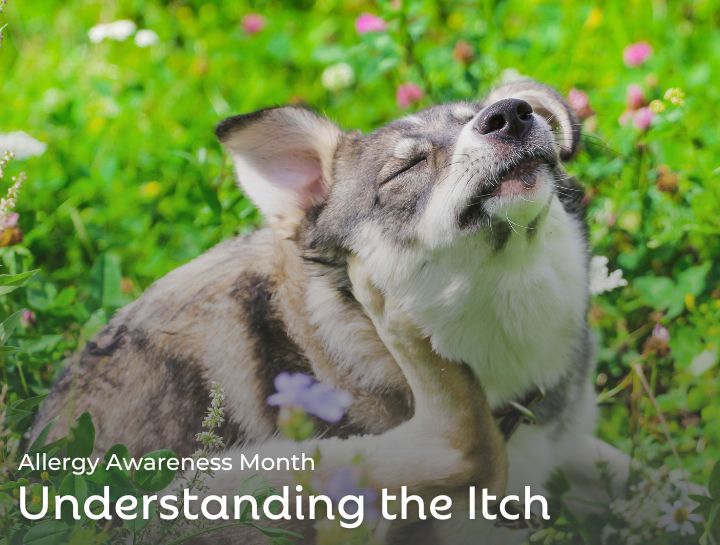Pet Allergies | Understanding the Itch

Have you noticed your pet scratching, biting, or developing a rash that seems to come out of nowhere? Your pet could be suffering from allergies. In this guide, we’ll dive deeper into common symptoms and causes and provide practical tips for managing your pet’s allergies at home.
What causes pet allergies:
Whether it’s pollen, certain foods, dust mites, or even household items, many things can trigger reactions from your pets. Environmental allergens such as pollen, dust, mites, and flea allergy dermatitis are the most common causes of allergies in pets. Food allergies, such as a reaction to food proteins, do happen, but are far less common.
Recognizing signs and symptoms:
Symptoms may include itching or even ear infections, making it tough for your pets to enjoy their everyday activities. Common signs include:
-
Excessive scratching or rubbing against furniture
-
Frequent biting or licking at specific areas, especially paws, belly, and groin
-
Skin rashes, redness, or inflammation
-
Hair loss (alopecia), often due to persistent licking or scratching
-
Recurrent head shaking, scratching at ears, or discharge
-
Changes in skin pigmentation
Remember, these symptoms can sometimes mimic other skin issues, such as flea infestations or infections. It’s important to note the timing of these symptoms to help differentiate potential pet allergies from other ailments. If you notice behaviors such as excessive scratching, watery eyes, and labored breathing, please contact our team for assistance. Additional signs that may indicate it’s time for a visit include:
-
Severe or rapidly worsening allergy symptoms
-
Signs of secondary skin infections (pus, odor, excessive redness or swelling)
-
Lack of improvement with home remedies
-
Significant discomfort or behavioral changes due to itching
-
Recurrent ear infections
How to combat pet allergies at home:
Implement strategies that will reduce allergens in your home. This includes regular cleaning in your home and especially the areas where your pet spends most of its time. (When’s the last time you’ve washed your pet’s bedding?) Keeping your pet’s coat clean and well-groomed can also help remove loose fur, dander, and any trapped allergens that worsen skin irritation. As for dietary allergies, be cautious when introducing new proteins to your pets, and contact us if you need diet recommendations.
How veterinarians diagnose allergies:
There isn't a single definitive test, so the process often involves ruling out other conditions and identifying potential triggers. Common methods include:
-
A comprehensive physical examination and detailed history of your pet's symptoms, diet, and environment
-
Skin tests, where small amounts of potential allergens are injected into the skin to observe for a reaction
-
Elimination diets, the gold standard for diagnosing food allergies. This involves feeding your pet a novel protein or hydrolyzed protein diet for a specific period and then gradually reintroducing previous food ingredients to identify the culprit
-
Blood tests can help identify environmental allergens
Your role in this process is crucial. Keeping a detailed timeline of your pet's symptoms and potential triggers, including when they occur, what your pet was exposed to, and any dietary changes, will provide invaluable information to us and help expedite the diagnostic process.
Treatments and medications:
We can provide various treatments and medications to alleviate your pet's allergy symptoms, including antihistamines, corticosteroids, immunosuppressants, injectables, topical medications, and immunotherapy.
Remember, pet allergies can be a lifelong condition, but with proper diagnosis and a collaborative approach between you and the team at Rehoboth Beach Animal Hospital, your furry friend can live a happy and itch-free life.
If your pet struggles with allergies, call us at (302) 227-2009 to make an appointment today.
